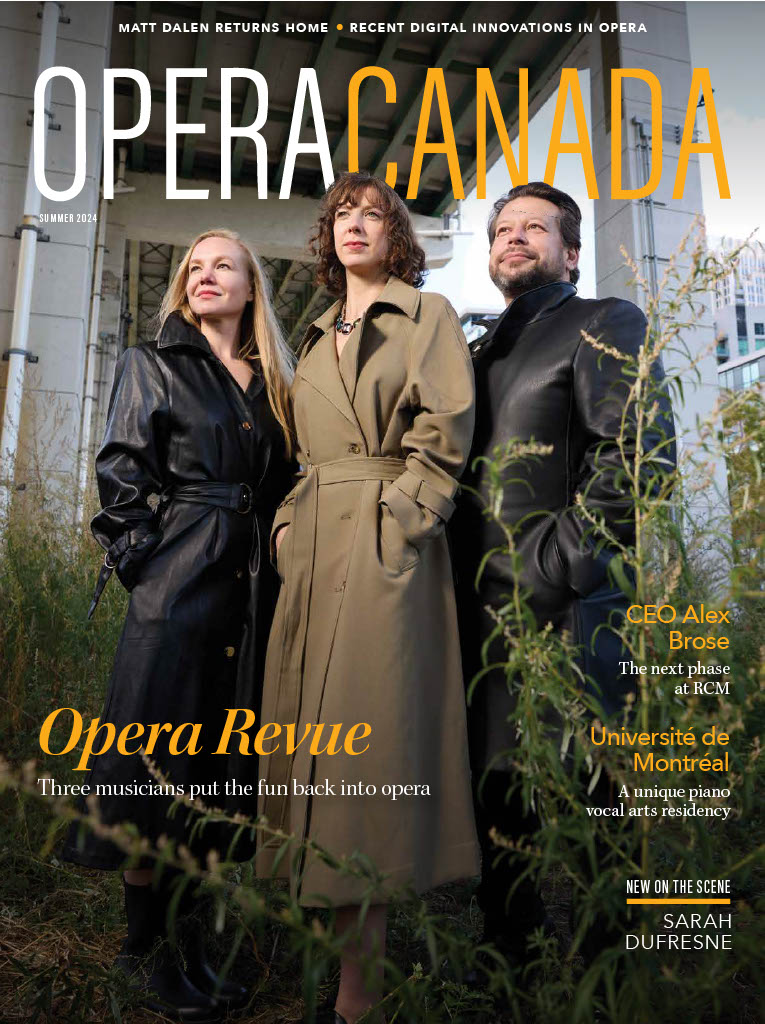At Zoomer Hall (the performing space of 96.3 New Classical FM) on Nov. 6, I had the pleasure of attending a concert involving ten young artists, under the auspices of IRCPA, short for International Resource Centre for Performing Artists. For the avid opera fan, there’s nothing quite as nice as hearing the voice of a fine opera singer at the beginning of a career – except when you get to hear ten of them in one sitting!
The event was broadcast live on radio, and videocast on the internet. These young singers had recently participated in an all-day “Encounter” with the renowned Canadian baritone Brett Polegato, who’s enjoying an enviable international career. The mandate of IRCPA, a brainchild of long-time artist manager/opera industry stalwart Ann Summer Dossena, is to “assist Canadian musicians to achieve sustainable, fulfilling careers that meet or exceed their goals.”
Consistently high levels of performance
I found the level of performances very high – all ten are equipped to go out and forge a career, with some fine-tuning. The participants were sopranos Brianna DeSantis, Valérie Bélanger (replacing tenor Jacques Arsenault who was indisposed), and Vania Margani; mezzo-soprano Beste Kalender, tenors Jean-Philippe Lazure and Asitha Tennekoon; and baritones Clarence Frazer, Bradley Christensen, David Diston and Andrey Andreychik. At the keyboard was the excellent and ever-supportive pianist/coach Rachel Andrist. All the seats in Zoomer Hall filled immediately and more had to be set up to accommodate the overflow.
Soprano Brianna DeSantis kicked off the proceedings with Laetitia’s aria, “Steal me, sweet thief” from The Old Maid and the Thief. This charming one-act “radio opera” by Giancarlo Menotti is very popular in music schools and this is one of its two popular arias. DeSantis’s bright, girlish tone is perhaps a bit too innocent sounding for the scheming Laetitia, but on balance, it was very well delivered. A fine start to the evening.
Next up was tenor Jean-Philippe Lazure (formerly Jean-Philippe Fortier-Lazure) a graduate of the COC Ensemble Studio. His choice was “Every valley” from Handel’s Messiah, a surprise I must say, as I would not have associated the Franco-Ontarian tenor with English oratorio. Judging by this performance, this repertoire suits him well, showing off his trademark warm compact-sized, ingratiating tone, with good flexibility.
Last minute substitute
While we were sad that Jacques Arsenault had to cancel, we got to hear soprano Valérie Bélanger in Sophie’s aria from Massenet’s Werther. She demonstrated a high, bright, vibrant tone with a touch of flutter. It makes for an appropriately girlish Sophie, who is after all the younger sister of Charlotte..
Baritone Clarence Frazer, another graduate of the COC Ensemble Studio, sang Wolfram’s aria from Wagner’s Tannhauser, one of his most ingratiating of creations for the lyric baritone, without the usual sturm und drang. It does require purity of tone, solid legato, and rock-solid pitch. Frazer handled the demands well.
New Zealand-Canadian baritone Bradley Christensen contributed Onegin’s aria from act one of Eugene Onegin. His imposing height, handsome stage presence and attractive lyric baritone make him potentially a fine Onegin vocally and dramatically, and he sang it well. He chose the lower option for the final note, even though it’s customary these days for most Onegins to sing it one octave higher, mezza voce. When host Kathleen Kajioka asked him where he learned his Russian, Christensen credited the tutoring of soprano Natalya Gennadi, who was in the audience. She is originally from the Ukraine, and a previous recipient of the IRCPA Career Blueprint Award.
No shirking challenges
Sri Lankan-Canadian tenor Asitha Tennekoon, who made a splash two years ago in Tapestry Opera’s Rocking Horse Winner, sang Belmonte’s “Ich baue ganz” from Die Entführung aus dem Serail. Arguably the most difficult of all Mozart tenor arias, it’s even tougher than “Il mio Tesoro.” Tennekoon sang it beautifully, with bright if somewhat cool tone and good runs, observant of Mozart’s markings, with sufficient breath to do it justice. The only thing missing to my ears was sufficient expression, particularly of the meaning of the text – after all it’s an aria about love.
Baritone David Diston sang Riccardo’s “Ah! Per sempre io ti perdei” from I puritani. This exacting bel canto piece requires a solid core to the tone, a firm legato, and an evenness of production. Mr. Diston has an Italianate sound and the right musical instincts for Bellini. On this occasion, he was troubled by some unsteadiness, primarily due to a hint of a slow vibrato that occasionally became intrusive. He did hit an excellent final high note, however.
Big voices, small hall
Italian-Canadian soprano Vania Margani sang that “calling-card aria” for many a lyric soprano, “Si, mi chiamano Mimì” from La bohème. Hers is a lovely, big, rich lyric voice, with plenty of squillo, and enough volume for big venues many times the size of Zoomer Hall. The confined space of this TV studio made her soprano, with its inherent cutting edge, a bit overpowering—this Mimi is no shrinking violet! She’d do well to develop more of a mezza voce, and greater dynamic shading.
Russian-Canadian baritone Andrey Andreychik sang Yeletsky’s aria from Tchaikovsky’s Pique Dame with an attractive, sturdy baritone. The voice is even up and down the scale, and unlike many Slavic singers, it is quite “forward” in placement. He sang the aria well. Once again, I missed sufficient chiaroscuro (light and shade) in his singing, which would make it more interesting and ameliorate a certain sameness in his delivery. He had good breath control, but eventually ran out when he held the last note of a very long phrase too long. That said, overall, a fine effort.
The final singer was Turkish-Canadian mezzo Beste Kalender, in Sesto’s “Parto, parto” from La clemenza di Tito. Like Belmonte’s “Ich baue ganz,” this is an equally daunting aria, and Ms. Kalender was up to the task with her rich, gleaming tone, abundant theatricality, and temperament to burn. Having just finished an engagement as Carmen the previous week, there was a vestige of the gypsy in her nobleman Sesto—a trouser role! No matter, she sang beautifully, except for some strain at the top of the two runs near the end of the aria. Sesto is really for a high mezzo, which Ms. Kalender is not.
And the IRCPA award goes to…
Following their performances, all 10 singers returned to the stage where Polegato announced that the recipient of the IRCPA Career Blueprint Award would go to Clarence Frazer. Mr. Polegato made a point of mentioning that all the singers were worthy of this special award, and that they should keep that in mind as they forge their careers.











